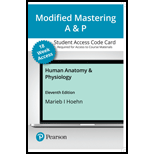
45-Year-Old Female with Motor Nerve Damage
In Chapters 7 and 8, you met Kayla Tanner, who suffered a dislocated right hip in a car accident. Six weeks later, Mrs. Tanner was still unable to walk or run without hip pain, and had weakness in flexion at the knee, excessive foot inversion and plantar flexion, and significant “foot drop” (the inability to dorsiflex the foot).

Electromyography (measurement of muscle electrical activity) and nerve conduction studies (measurement of the speed of nerve impulses) revealed sciatic nerve damage, most likely a result of the nerve being compressed when the hip was dislocated. This large nerve innervates many lower limb muscles. Since her surgery, Mrs. Tanner has been undergoing intense physical therapy and has shown significant improvement.
4. For each description below, name the muscle (or muscles) that the therapist was assessing.
a. With Mrs. Tanner in the seated position, the therapist positioned Mrs. Tanner’s knees shoulder-width apart, then asked Mrs. Tanner to bring her knees together while the therapist applied resistance to the right thigh.
b. The therapist applied resistance to the top of Mrs. Tanner’s foot and asked her to pull her forefoot up toward her shin.
c. With Mrs. Tanner in the prone position (on her stomach), the therapist applied resistance to the leg while Mrs. Tanner tried to bring her heel up toward her buttocks (flex her leg at the knee).
Want to see the full answer?
Check out a sample textbook solution
Chapter 10 Solutions
HUMAN ANATOMY + PHYSIOLOGY + MAST AP
- What are biofertilizers and mention the significancearrow_forwardPCBs and River Otters: Otters in Washington State’s Green-Duwamish River have high levels of polychlorinated biphenyls (PCBs) in their livers. PCBs can bind to the estrogen receptors in animals and disrupt the endocrine system of these otters. The PCBs seem to increase the estrogen to androgen ratio, skewing the ratio toward too much estrogen. How would increased estrogen affect the river otter population? Based on your reading of the materials in this unit, what factors can affect fertility in humans? Explain how each of the factors affecting human fertility that you described can disrupt the human endocrine system to affect reproduction.arrow_forwardOther than oil and alcohol, are there other liquids you could compare to water (that are liquid at room temperature)? How is water unique compared to these other liquids? What follow-up experiment would you like to do, and how would you relate it to your life?arrow_forward
- Selection of Traits What adaptations do scavengers have for locating and feeding on prey? What adaptations do predators have for capturing and consuming prey?arrow_forwardCompetition Between Species What natural processes limit populations from growing too large? What are some resources organisms can compete over in their natural habitat?arrow_forwardSpecies Interactions Explain how predators, prey and scavengers interact. Explain whether predators and scavengers are necessary or beneficial for an ecosystem.arrow_forward
- magine that you are conducting research on fruit type and seed dispersal. You submitted a paper to a peer-reviewed journal that addresses the factors that impact fruit type and seed dispersal mechanisms in plants of Central America. The editor of the journal communicates that your paper may be published if you make ‘minor revisions’ to the document. Describe two characteristics that you would expect in seeds that are dispersed by the wind. Contrast this with what you would expect for seeds that are gathered, buried or eaten by animals, and explain why they are different. (Editor’s note: Providing this information in your discussion will help readers to consider the significance of the research).arrow_forwardWhat is the difference between Uniporters, Symporters and Antiporters? Which of these are examples of active transport?arrow_forwardWhat are coupled transporters?arrow_forward
 Medical Terminology for Health Professions, Spira...Health & NutritionISBN:9781305634350Author:Ann Ehrlich, Carol L. Schroeder, Laura Ehrlich, Katrina A. SchroederPublisher:Cengage LearningEssentials of Pharmacology for Health ProfessionsNursingISBN:9781305441620Author:WOODROWPublisher:Cengage
Medical Terminology for Health Professions, Spira...Health & NutritionISBN:9781305634350Author:Ann Ehrlich, Carol L. Schroeder, Laura Ehrlich, Katrina A. SchroederPublisher:Cengage LearningEssentials of Pharmacology for Health ProfessionsNursingISBN:9781305441620Author:WOODROWPublisher:Cengage





